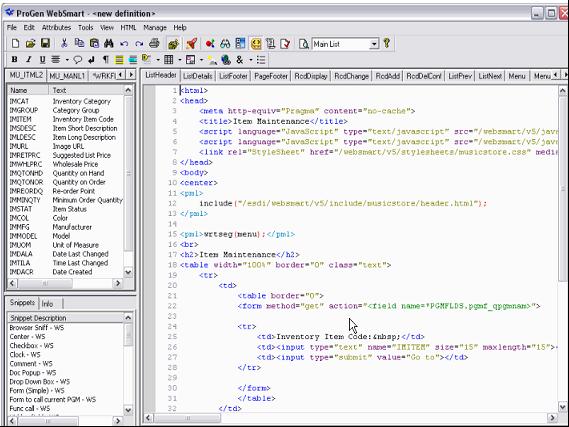And I also don't much like the vendors that participate in it, especially the ones whose primary purpose is to move existing iSeries customers off of the box onto a Wintel solution. Over the past couple of years, I've debunked any possible tales of savings, either short- or long-term, from moving to Wintel. Similar arguments can be made against moves to UNIX or Linux, although costs there tend more toward the technical support requirements of keeping various disparate packages working together.
So that being the case, what in the world is this article going to be about? Well, there's a way to migrate and stay on the iSeries, which is to migrate from RPG and DDS to another language. Now, those who know my RPG evangelism will wonder why I would even entertain such a notion as moving off what I consider the best application development language on the planet, and the truth is that I can't see a lot of good reasons to do it. However, it's hard to argue when the boss reads some "expert resource" who predicts (for the umpteenth time) the demise of RPG and then gets it in his head that he needs a different solution.
Options
There are vendors out there who will convert your code to just about anything. I have seen RPG to Java, RPG to C, and even RPG to COBOL. One of the biggest problems with the majority of these vendors is that they're all or nothing, and in fact many are designed to move you off of the platform entirely. I've said this before; I think it's criminal for any vendor to recommend moving mission-critical systems off the iSeries. There are simply no scenarios in which the reliability and cost of ownership of an existing iSeries box can be beaten by another server platform.
There are several vendors who Web-enable existing RPG applications, but there are few vendors who will convert RPG into code designed to run on the iSeries. ASC has its RIO (RPG Into Objects) tool, and BCD Software recently released a tool to convert existing applications to the PML language of its flagship WebSmart. Let's take a look at the latter product.
WebSmart
WebSmart is an application development tool from BCD Software. It comes with its own IDE that allows you to create applications for the Web. WebSmart's primary development languages are HTML for the user interface and BCD's own proprietary PML language.

Figure 1: This is the WebSmart IDE (Click on image to enlarge).
So why move to PML? I recently talked to Duncan Kenzie, President of BCD Technical Support, and he pointed out a number of reasons. First, he commented that the word "proprietary" is one that needs some clarification; PML is indeed a proprietary language, but some other products require you to call their external procedures and thus you have to learn their function names and parameters, and that's similar to learning a new language (though to a lesser degree).
Also, it's not as if you have to rewrite everything. BCD recently announced a new migration tool, RPG/DDS to Web or RDW, which will convert existing programs to the PML language. They don't claim 100% conversion success, but a large portion of your code can indeed be converted.
So the next topic is the language itself (and the advantages it gives you over RPG). As I see it, PML's primary strength is its flexibility. It provides syntax for standard application development functions, but it also supports a number of built-in functions that extend the language to directly access SQL, RPG, and Java.
Many benefits arise from this. First is programmer productivity; while PML is very good at standard record-level I/O, the syntax for embedded SQL is not as difficult as RPG's (although the V5R4 release of RPG will make life a lot easier in this regard). The syntax for calling programs and invoking commands is very similar. Thus, it's easy to mix calls to SQL, to other ILE programs, and to OS/400 commands using a single consistent programming style.
WebSmart also understands how prototypes work. You can define prototypes for bound procedures (and if you make a call, WebSmart sets up all the appropriate binder source entries to compile your program). You can also define what are in effect prototypes for programs that use good old PLISTs. The benefit is that the WebSmart IDE has the standard context assist features of any good IDE and will provide appropriate hints as you type in your call.
And while (unlike many other so-called "iSeries" vendors) WebSmart continues with its focus on the iSeries, it also contains certain features that provide cross-platform capabilities. One is that PML will allow you to generate either RPG or Java code with "a flip of a switch." WebSmart's SQL functions will be generated as Java code calling JDBC, which can in turn access any other database available on the network. Because of this capability, WebSmart will allow you to build applications that can access both iSeries and non-iSeries data simultaneously.
Programs written purely with SQL access can even be moved off of the iSeries, although you won't hear me cheering about that. But I guess if you have to write non-iSeries components as part of your system, it's good to have a single dedicated IDE that can build both iSeries and non-iSeries programs. That way, you don't dump the iSeries because of the development tool. If, on the other hand, someone were to use Visual Studio .NET to do user interface work, eventually it would become counterproductive to have to switch back to either PDM or WDSC in order to use the iSeries back-end, and that would become one more argument against the iSeries.
Kenzie was careful to not over-hype the switch-flipping analogy; you have to be careful with what you do. Obviously, if you use record-level access for your programming, you won't be able to just recompile it to use a different database. On the other hand, since PML has strong built-in SQL support, you can easily build cross-platform modules that access other databases. And you can also use the WebSmart IDE to build small, non-Web programs that have no built-in user interface. These programs can be called by legacy programs as well as by other WebSmart programs.
So, is PML a good replacement for RPG? It depends on your architectural approach. If you really want to get away from RPG and DDS but you want to stay on the iSeries, PML is a powerful alternative, and the Java capabilities of accessing multiple databases are intriguing. If somebody told me I couldn't use RPG anymore, PML would be a top contender.
Joe Pluta is the founder and chief architect of Pluta Brothers Design, Inc. He has been working in the field since the late 1970s and has made a career of extending the IBM midrange, starting back in the days of the IBM System/3. Joe has used WebSphere extensively, especially as the base for PSC/400, the only product that can move your legacy systems to the Web using simple green-screen commands. Joe is also the author of E-Deployment: The Fastest Path to the Web, Eclipse: Step by Step, and WDSc: Step by Step. You can reach him at


























 More than ever, there is a demand for IT to deliver innovation. Your IBM i has been an essential part of your business operations for years. However, your organization may struggle to maintain the current system and implement new projects. The thousands of customers we've worked with and surveyed state that expectations regarding the digital footprint and vision of the company are not aligned with the current IT environment.
More than ever, there is a demand for IT to deliver innovation. Your IBM i has been an essential part of your business operations for years. However, your organization may struggle to maintain the current system and implement new projects. The thousands of customers we've worked with and surveyed state that expectations regarding the digital footprint and vision of the company are not aligned with the current IT environment. TRY the one package that solves all your document design and printing challenges on all your platforms. Produce bar code labels, electronic forms, ad hoc reports, and RFID tags – without programming! MarkMagic is the only document design and print solution that combines report writing, WYSIWYG label and forms design, and conditional printing in one integrated product. Make sure your data survives when catastrophe hits. Request your trial now! Request Now.
TRY the one package that solves all your document design and printing challenges on all your platforms. Produce bar code labels, electronic forms, ad hoc reports, and RFID tags – without programming! MarkMagic is the only document design and print solution that combines report writing, WYSIWYG label and forms design, and conditional printing in one integrated product. Make sure your data survives when catastrophe hits. Request your trial now! Request Now. Forms of ransomware has been around for over 30 years, and with more and more organizations suffering attacks each year, it continues to endure. What has made ransomware such a durable threat and what is the best way to combat it? In order to prevent ransomware, organizations must first understand how it works.
Forms of ransomware has been around for over 30 years, and with more and more organizations suffering attacks each year, it continues to endure. What has made ransomware such a durable threat and what is the best way to combat it? In order to prevent ransomware, organizations must first understand how it works. Disaster protection is vital to every business. Yet, it often consists of patched together procedures that are prone to error. From automatic backups to data encryption to media management, Robot automates the routine (yet often complex) tasks of iSeries backup and recovery, saving you time and money and making the process safer and more reliable. Automate your backups with the Robot Backup and Recovery Solution. Key features include:
Disaster protection is vital to every business. Yet, it often consists of patched together procedures that are prone to error. From automatic backups to data encryption to media management, Robot automates the routine (yet often complex) tasks of iSeries backup and recovery, saving you time and money and making the process safer and more reliable. Automate your backups with the Robot Backup and Recovery Solution. Key features include: Business users want new applications now. Market and regulatory pressures require faster application updates and delivery into production. Your IBM i developers may be approaching retirement, and you see no sure way to fill their positions with experienced developers. In addition, you may be caught between maintaining your existing applications and the uncertainty of moving to something new.
Business users want new applications now. Market and regulatory pressures require faster application updates and delivery into production. Your IBM i developers may be approaching retirement, and you see no sure way to fill their positions with experienced developers. In addition, you may be caught between maintaining your existing applications and the uncertainty of moving to something new. IT managers hoping to find new IBM i talent are discovering that the pool of experienced RPG programmers and operators or administrators with intimate knowledge of the operating system and the applications that run on it is small. This begs the question: How will you manage the platform that supports such a big part of your business? This guide offers strategies and software suggestions to help you plan IT staffing and resources and smooth the transition after your AS/400 talent retires. Read on to learn:
IT managers hoping to find new IBM i talent are discovering that the pool of experienced RPG programmers and operators or administrators with intimate knowledge of the operating system and the applications that run on it is small. This begs the question: How will you manage the platform that supports such a big part of your business? This guide offers strategies and software suggestions to help you plan IT staffing and resources and smooth the transition after your AS/400 talent retires. Read on to learn:
LATEST COMMENTS
MC Press Online